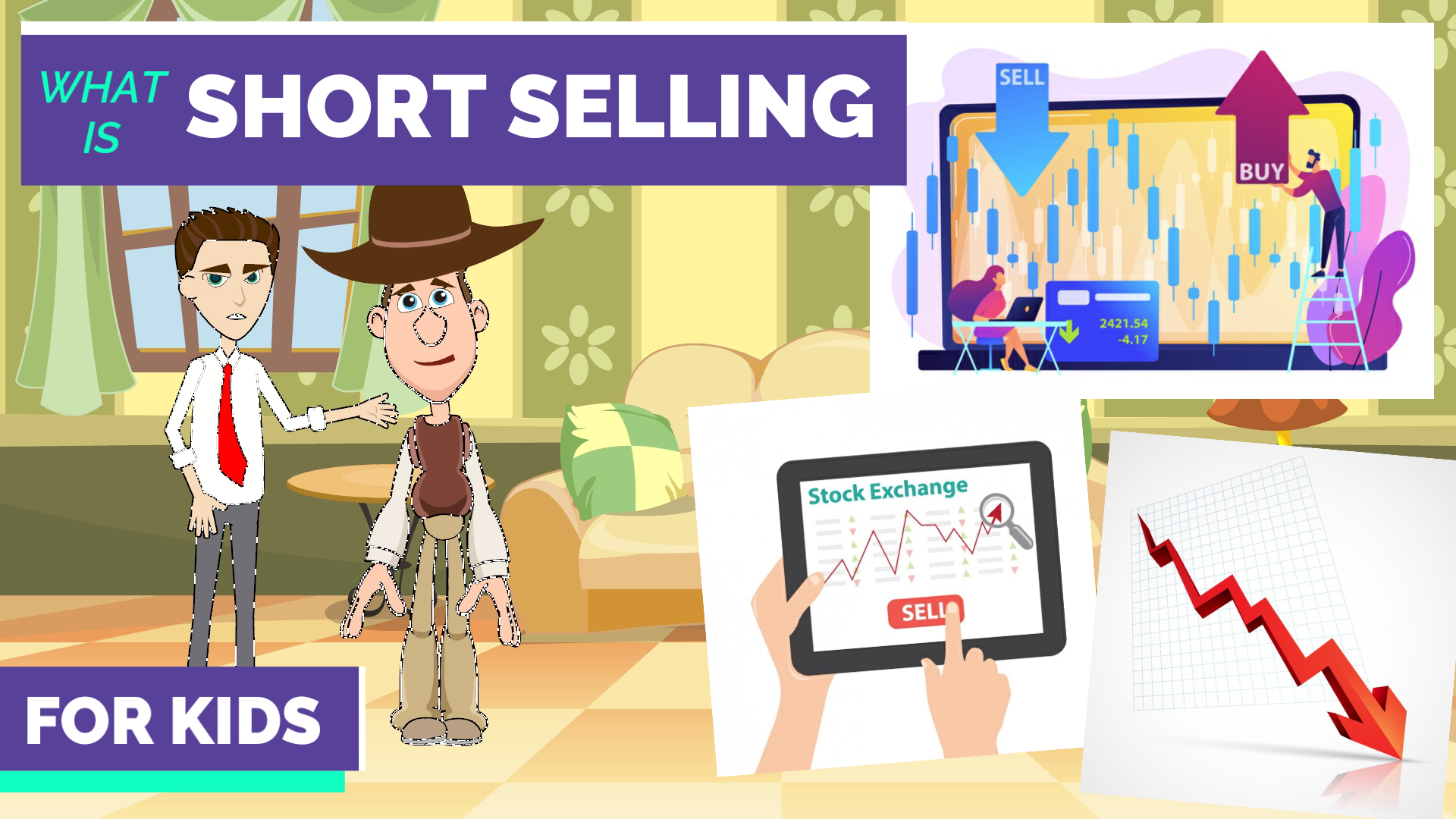Part 1: What is Short Selling?
Part 2: Short Selling – Advantages and Disadvantages
Introduction to Short Selling for Kids and Teens
This video explains the concept of short selling in a simple, concise way for kids and beginners. It could be used by kids & teens to learn about selling short, or used as a money & personal finance resource by parents and teachers as part of a Financial Literacy course or K-12 curriculum.

Suitable for students from grade levels:
- Elementary School
- Middle School
- High School
The topics covered are:
- What is Short Selling
- Detailed Example
- Why short sell in spite of the risk
- Special requirements
- Advantages / pros of short selling
- Disadvantages / cons of selling short
- Should you short sell
What is Short Selling?

In simple terms, short selling is selling stocks that you do not own, with the intention of making a profit by buying back the same stocks later at a lower price.
Since you do not own the stocks you short sell, you borrow them from your broker for a fee.
Can you give me an example?
Let’s say Jen thinks the price of Netflix stock is going to go down and wants to make a profit. She can short sell some shares of Netflix by borrowing them from her broker, and immediately selling them at their current market price.
Jen would then wait for the Netflix stock price to go down before she buys back the shares. This way she can buy them for less money than she sold them for earlier, thereby making a profit. She would then return those shares to her broker.
But, if the Netflix stock price goes up, Jen would have to buy the stocks for a higher price than she sold them for earlier, resulting in a loss. This makes Short Selling very risky.
If short selling is so risky, why would someone sell short?
There are 2 main reasons.
1: Speculation
Short selling is done by someone who thinks a stock’s price will go down in the future. It lets you take advantage of declining stock price even when you don’t own the stock.
2: Hedging Risk
If you own some shares of a company but are worried the sector is not performing well, then you could short shares of another company in the same sector.
That way, if the sector performs well, you make gain from the stocks you own. And if the sector does poorly, you can still make gains from the stock you shorted.
Are there any special requirements for short selling?
Yes, there are. But we’ll talk about that, along with the pros and cons of short selling, in part 2 of this video.
Click to Tweet
In part 1 of short selling, you said short selling has some special requirements. Can you tell me more?
In order to short sell, you need a special brokerage account, called a margin account. In this account, you need to set aside some money – called margin amount – as well as the money from the short sale, until the shares are returned to the broker.
Since short selling involves borrowing stocks, a margin account ensures there is enough money for the broker to recover in case you are not able to return the borrowed shares.
What are the advantages of short selling?
The main advantage of short selling is that you could make a lot of money from a falling stock price if your prediction is right.
You could also reduce your losses by hedging your position.
Are there any disadvantages?

Yes. Since you are borrowing the shares you short, you have to pay your broker a fee. And, the longer you wait before returning the stocks, the more the fee is.
You also pay commissions for the trades.
Also, to short sell, you need to have enough money to maintain a margin account. The margin money and the money from the short sale cannot be used for any transactions until you return the shares to the broker.
Should I short sell?
Short selling is probably not the best strategy for new or inexperienced investors since it is so risky. And even if you do make a gain, commissions and fees can quickly add up, eating into your profit.
But there are other investment strategies that can help you make consistent gains. One of these is called Dollar Cost Averaging – click here to learn more.
Download Transcript: Ideal for Use by Teachers in their Lesson Plan to Teach Kids & Teens
Part 1: What is Short Selling?
Part 2: Short Selling – Advantages and Disadvantages
Podcast
Part 1: What is Short Selling?
Fun, informative and concise episodes by a 10-year old, breaking down complex financial concepts in a way that kids and beginners can understand. Episodes cover personal finance topics like saving, investing, banking, credit cards, insurance, real estate, mortgage, retirement planning, 401k, stocks, bonds, income tax, and more, and are in the form of a conversation between a cowboy (a finance novice) and his friend, a stock broker. Making finance your friend, only at Easy Peasy Finance.
A little bit about me: I have been fascinated with the world of personal finance since I was 6! I love to read personal finance books, and keep myself updated on the latest by reading various personal finance magazines. My friends often ask me questions about finance because they find it complex and intimidating. That’s what inspired me to start my YouTube channel called Easy Peasy Finance when I was 8, and this podcast 2 years later.
Everything you need to know about short selling: What is Short Selling, Detailed example of short selling, Is short selling risky, Why would someone short sell, Are there any special requirements for short selling, and more.
Show notes and transcript at: https://www.easypeasyfinance.com/short-selling-for-kids-teens-beginners/

Part 2: Short Selling – Advantages and Disadvantages
Fun, informative and concise episodes by a 10-year old, breaking down complex financial concepts in a way that kids and beginners can understand. Episodes cover personal finance topics like saving, investing, banking, credit cards, insurance, real estate, mortgage, retirement planning, 401k, stocks, bonds, income tax, and more, and are in the form of a conversation between a cowboy (a finance novice) and his friend, a stock broker. Making finance your friend, only at Easy Peasy Finance.
A little bit about me: I have been fascinated with the world of personal finance since I was 6! I love to read personal finance books, and keep myself updated on the latest by reading various personal finance magazines. My friends often ask me questions about finance because they find it complex and intimidating. That’s what inspired me to start my YouTube channel called Easy Peasy Finance when I was 8, and this podcast 2 years later.
The pros and cons of short selling: What are the special requirements for short selling, What are the advantages of short selling, What are the disadvantages of short selling, Should you short sell, and more.
Show notes and transcript at: https://www.easypeasyfinance.com/short-selling-for-kids-teens-beginners/


